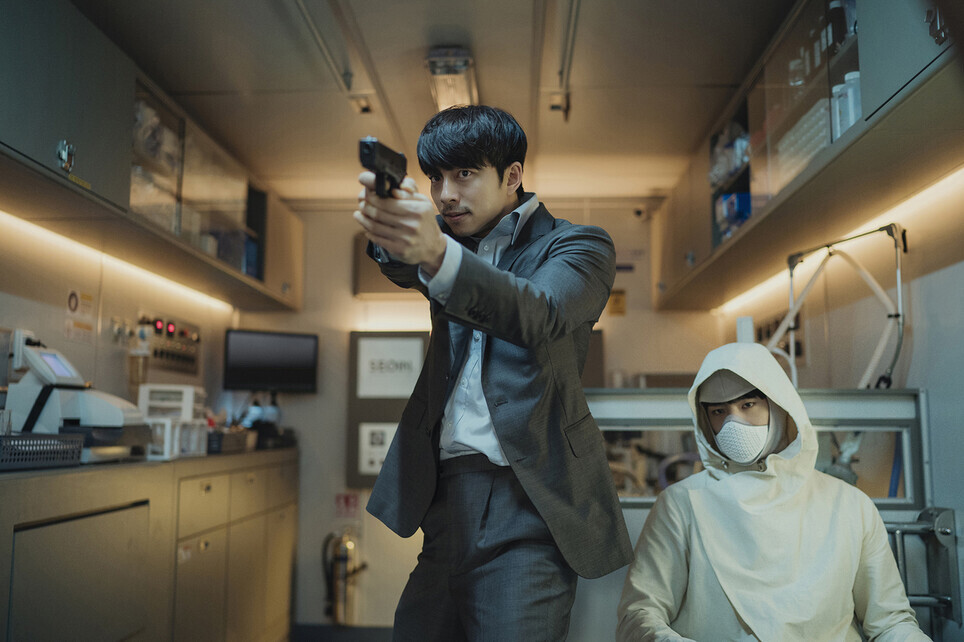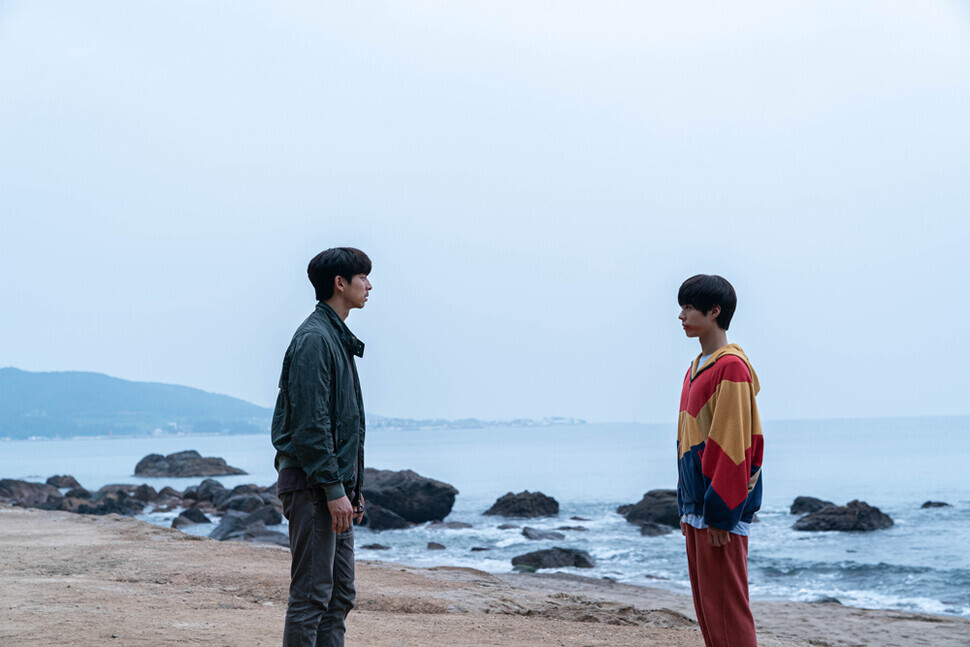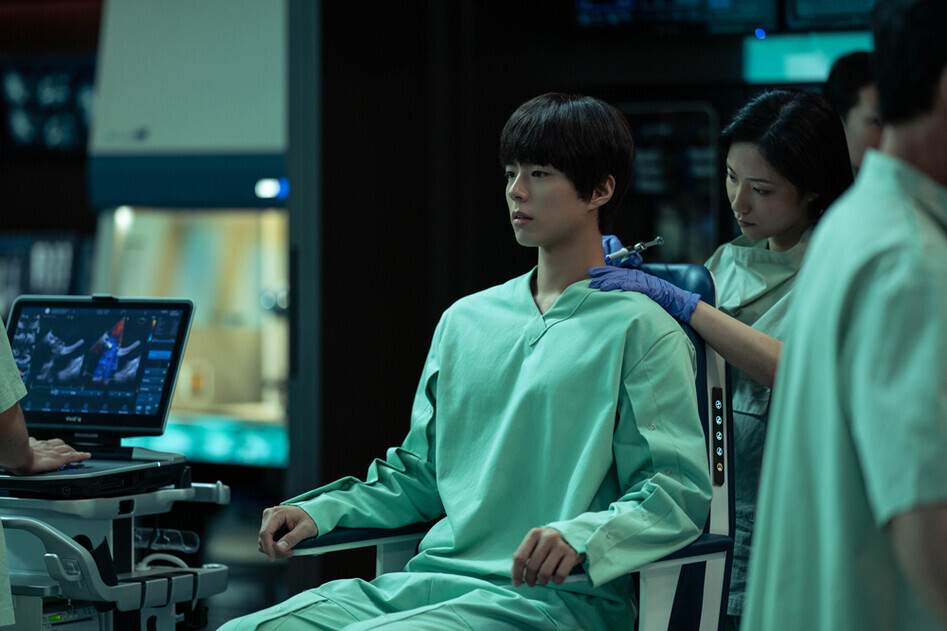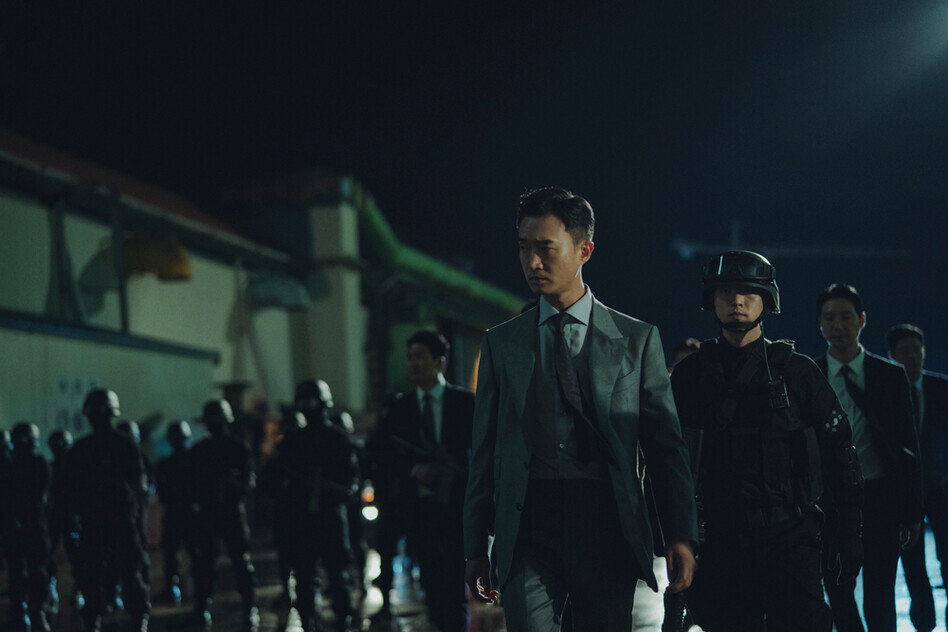hankyoreh
Links to other country sites 다른 나라 사이트 링크
[Film review] “Seo Bok” explores human mortality to seek meaning of life

One characteristic of humans as a species is that we are aware of our own mortality. Death is frightening because it is unknowable and cannot be experienced until it happens.
As one author put it, the fact that we all die may be “life’s spoiler.” It’s a clear truth, but also one we often forget so that we can get on with our lives.
“Seo Bok,” the new film by director Lee Yong-ju, is a work of science fiction that addresses the matter of death as something we disregard for being all too familiar.
Min Gi-heon (Gong Yoo) is a former intelligence agent who is close to death, relying on drugs to stay alive. One day, he gets an offer that he can’t refuse. It’s a mission that involves transporting Seo Bok (Park Bo-gum), the first-ever cloned human, to a safe location.

As he enters a large ship docked in the harbor, he sees the laboratory where the Seoin Group has been secretly experimenting with human cloning. It is there that he meets Seo Bok.
Shin Hak-seon (Park Byung-eun), a researcher and CEO of the Seoin Group, explains to Gi-heon that the clone was “named after the minister [Xu Fu] who set out on a long journey after being ordered by Emperor Qin Shi Huang to find the elixir of eternal youth.”
Created 10 years earlier through a method involving genetic manipulation and stem cell cloning, Bok grows at a rate twice as fast as other humans. Proteins formed in his spinal cord can be used to cure all diseases suffered by humankind. When Gi-heon questions Bok’s immortality, the researchers show him Bok’s special ability to move objects with his mind.
Later, Gi-heon and Bok are traveling somewhere under the intelligence agency’s guard when attacked and detained by a foreign unit. They manage to escape by truck and end up being pursued by various people.
Unable to trust anyone else, the two of them gradually come to understand each other’s inner scars. Meanwhile, the people seeking to abduct Bok draw ever closer, and the two of them are drawing into a vortex with no end in sight.
A major production with a budget of 16 billion won (US$14.3 million), “Seo Bok” is a genre film where dark and heavy subject matter related to death has been sugarcoated with sci-fi elements.

The plot is streamlined, and the actors’ performances impress. Fans of the two leads are sure to be beguiled by the chemistry they show as the bickering Gi-heon and Bok get to know each other. In particular, viewers are drawn deeper into the story as Park’s performance transitions from his dry, expressionless portrayal of the clone early on toward something more emotional in the second half.
With its journey pairing an immortal being with another person on the brink of death, the film questions the absurdity of the human desire for eternal life.
Like other human beings, Seo Bok was born without regard for his own wishes, yet he is not treated as a full-fledged human. This is why he wishes to become a living person — which makes his choice near the end of the film all the more meaningful.
At one point, Im Se-eun (Jang Young-nam), one of the researchers involved in creating clones, remarks, “People are really fearful, aren’t they? Greedy, too.” Her words are a pointed comment both on the fate of humans to fear their own death, and on the futility of our desire to triumph over it.
The theme of “Seo Bok” seems to be the idea that death is what makes humans human — and that there can be no life without death.
During the 1990s, Korean cinema underwent a renaissance, thanks to directors who adhered to a strong auteurist perspective while staying true to genre film practice. Carrying on that lineage, Lee Yong-ju made his debut in 2009 with “Possessed,” a film that used occult elements to tell a story about religious mania driving a young woman to her death.
His 2012 melodrama “Architecture 101” was a major artistic and commercial achievement that sparked a “first love syndrome” phenomenon.

Appearing at a talk with reporters following a press screening of “Seo Bok” Monday, Lee explained why he chose to work in the sci-fi genre this time.
“I didn’t deliberately choose to work in a different genre from the past. I ended up picking a suitable genre as I was developing a story around the topic,” he said.
After having its premiere repeatedly delayed since last year by the COVID-19 pandemic, “Seo Bok” is scheduled to open Thursday simultaneously in theaters and on the online streaming service Tving.
Some highly anticipated Korean films had previously skipped a theatrical release and headed straight to Netflix, including “Space Sweepers,” “Time to Hunt” and “Night in Paradise.” This is to be the first time a film has premiered simultaneously in theaters and on online streaming.
Now it remains to be seen whether this polished, well-acted Korean sci-fi work will be a hit with viewers.
By Oh Seung-hun, staff reporter
Please direct comments or questions to [english@hani.co.kr]

Editorial・opinion
![[Column] Park Geun-hye déjà vu in Yoon Suk-yeol [Column] Park Geun-hye déjà vu in Yoon Suk-yeol](https://flexible.img.hani.co.kr/flexible/normal/500/300/imgdb/original/2024/0424/651713945113788.jpg) [Column] Park Geun-hye déjà vu in Yoon Suk-yeol
[Column] Park Geun-hye déjà vu in Yoon Suk-yeol![[Editorial] New weight of N. Korea’s nuclear threats makes dialogue all the more urgent [Editorial] New weight of N. Korea’s nuclear threats makes dialogue all the more urgent](https://flexible.img.hani.co.kr/flexible/normal/500/300/imgdb/original/2024/0424/7317139454662664.jpg) [Editorial] New weight of N. Korea’s nuclear threats makes dialogue all the more urgent
[Editorial] New weight of N. Korea’s nuclear threats makes dialogue all the more urgent- [Guest essay] The real reason Korea’s new right wants to dub Rhee a founding father
- [Column] ‘Choson’: Is it time we start referring to N. Korea in its own terms?
- [Editorial] Japan’s rewriting of history with Korea has gone too far
- [Column] The president’s questionable capacity for dialogue
- [Column] Are chaebol firms just pizza pies for families to divvy up as they please?
- [Column] Has Korea, too, crossed the Rubicon on China?
- [Correspondent’s column] In Japan’s alliance with US, echoes of its past alliances with UK
- [Editorial] Does Yoon think the Korean public is wrong?
Most viewed articles
- 1‘We must say no’: Seoul defense chief on Korean, USFK involvement in hypothetical Taiwan crisis
- 2Will NewJeans end up collateral damage in internal feud at K-pop juggernaut Hybe?
- 3[Column] Park Geun-hye déjà vu in Yoon Suk-yeol
- 4Why Korea shouldn’t welcome Japan’s newly beefed up defense cooperation with US
- 5Thursday to mark start of resignations by senior doctors amid standoff with government
- 6N. Korean hackers breached 10 defense contractors in South for months, police say
- 7[Guest essay] The real reason Korea’s new right wants to dub Rhee a founding father
- 8[Column] ‘Choson’: Is it time we start referring to N. Korea in its own terms?
- 9Kim Jong-un expressed ‘satisfaction’ with nuclear counterstrike drill directed at South
- 10[Editorial] New weight of N. Korea’s nuclear threats makes dialogue all the more urgent